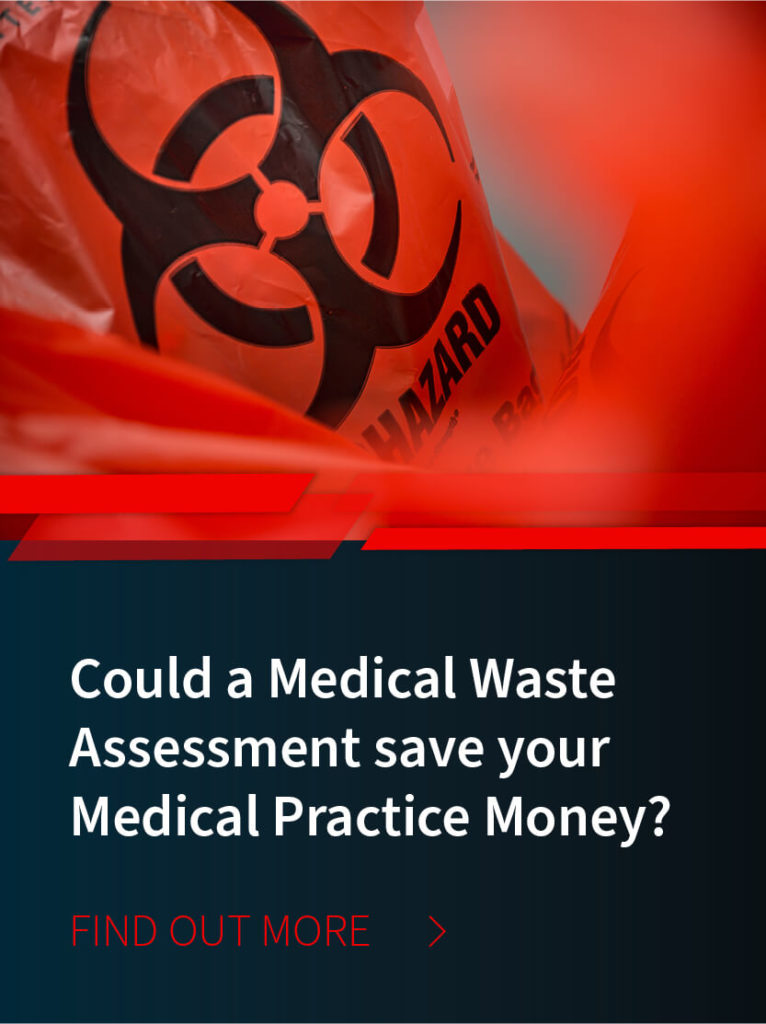
/ IN THIS BLOG
A Medical Waste Assessment Can Cut Costs for Your Practice
Medical waste assessments might not be on the top of your agenda if you’re an integral part of a medical practice. Schedules are hectic, whether you’re a leader at a private practice, an outpatient clinic or at a specialist doctor’s office. You know that medical waste disposal is a necessary expense for any healthcare facility, but without a proper assessment, many practices unknowingly overspend. If you’ve faced sticker shock when reviewing waste management pricing for medical practices, an assessment should be especially helpful.
From misclassified waste and excessive pickup schedules to hidden fees and non-compliance risks, inefficient waste management can add up to thousands of dollars in unnecessary costs each year. A medical waste assessment provides a comprehensive review of your current waste disposal practices, which means it can catch the inefficiencies and help eliminate waste mismanagement, improving your bottom line.
Learn why this step is important for your practice and how you can easily obtain a complete and thorough assessment practically and efficiently.
01 / What Is a Medical Waste Assessment?
A medical waste assessment can be a simple process once you understand what it entails. Simply put, this type of assessment provides a detailed evaluation of your practice’s waste disposal processes, volume, and compliance measures. It’s done to ensure efficiency and cost-effectiveness of your medical waste practices.
Many healthcare facilities unknowingly overpay for waste disposal due to improper waste classification, excessive pickup frequencies, or outdated vendor contracts. The best part about this process is you don’t have to do it alone. At MCF Environmental Services, for instance, we’re happy to help you complete a professional assessment to uncover these inefficiencies, providing you with customized recommendations to reduce costs while staying compliant with EPA and state regulations.
Key Areas Evaluated in a Medical Waste Assessment
It’s important to not overlook areas, as only a thorough medical waste assessment can give you a clear and accurate view of your practices. A thorough medical waste assessment should include the following parts:
Waste Segregation & Classification: Many practices dispose of general waste, sharps, and pharmaceuticals in the same bins. This leads to higher disposal fees, but an assessment can help to spot these issues to ensure waste is properly categorized. When you properly segregate your waste, your practice can avoid paying regulated medical waste rates for non-hazardous materials.
Pickup Frequency Optimization: Unnecessary waste pickups can drive up costs. An assessment will review your facility’s waste generation patterns to determine whether it would be beneficial to reduce pickup frequency or switch to a more efficient scheduling model to lower your overall waste management pricing.
Container Sizing & Placement: Overfilled or underutilized waste containers often lead to inefficient disposal costs. A waste assessment evaluates proper bin placement, sizing, and accessibility, ensuring staff can efficiently dispose of waste without increasing expenses. This can also help with your practice’s workflow and makes daily work run smoother, particularly during busy times.
Regulatory Compliance & Risk Reduction: Non-compliant waste disposal can result in fines ranging from hundreds to thousands of dollars per violation. An assessment ensures your documentation, labeling, and handling procedures meet federal and state requirements, preventing costly penalties and providing priceless peace of mind.
02 / Common Hidden Costs in Medical Waste Management
At MCF Environmental Services, we conduct many medical waste assessments each year for doctor’s offices and clinics. Often we find that medical practices unknowingly overspend on waste disposal due to inefficiencies that can go unnoticed. Without a medical waste assessment, you may continue to pay too much for waste practices.
Waste management pricing for medical practices can spiral out of control if left unchecked. It’s important to review your vendor contracts and never sign something without a second opinion to protect your practice from getting locked in a costly vendor contract. Identifying these hidden costs can lead to significant savings while ensuring compliance with state and federal regulations.
Overpaying for Volume
One of the most common ways practices waste money is by paying for unnecessary waste pickups. Many providers schedule automatic pickups without adjusting for actual waste generation. This means that your practice could be paying for half-empty bins to be collected. Additionally, misclassifying non-hazardous waste as regulated medical waste can often triple disposal costs. A waste assessment helps ensure that only true biohazardous waste is being disposed of at regulated rates, reducing excess costs.
Non-Compliant Disposal Fees
Improper waste disposal can lead to steep fines from regulatory agencies like the EPA and state departments. Common violations include mislabeling biohazardous waste, improper storage, and incomplete disposal records. Fines can range from hundreds to thousands of dollars per infraction, making non-compliance a major financial liability. A medical waste assessment ensures your facility follows all regulatory requirements, preventing unexpected penalties.
Inefficient Vendor Contracts
Without a regular review, many medical practices remain locked into outdated, overpriced service contracts. Some waste disposal companies include hidden fees, rigid service agreements, or excessive pickup schedules that don’t reflect your practice’s actual needs. A waste assessment helps identify better pricing options, renegotiate contracts, or even switch providers to ensure your waste management pricing for medical practices aligns with your budget.
03 / How a Medical Waste Assessment Optimizes Costs
A medical waste assessment doesn’t just uncover hidden fees, it will help reveal actionable strategies that your practice can use to cut waste disposal costs while remaining fully compliant. By analyzing waste volume, staff practices, and vendor pricing, an assessment ensures your facility isn’t overpaying for services or disposing of waste inefficiently.
Right-Sizing Waste Disposal Services
Many medical practices pay for more frequent pickups than they actually need, leading to unnecessary expenses. A waste assessment evaluates your actual waste output so you can better schedule pickups when there’s real demand, eliminating excess collections. This helps ensure that you only pay for what you truly need, rather than a one-size-fits-all service plan that doesn’t reflect your practice’s waste patterns and needs.
Proper Waste Segregation Training
A significant portion of medical waste disposal costs comes from misclassification of waste. When non-hazardous items—like paper towels, gloves, and packaging—are disposed of as regulated medical waste, disposal costs can skyrocket. A waste assessment provides training and best practices for staff, ensuring biohazardous, pharmaceutical, and general waste are properly separated. By reducing the volume of regulated medical waste, your practice can significantly lower disposal fees.
Vendor Cost Comparisons
Not all waste management providers offer the same level of service, flexibility, or pricing. Without regular contract reviews, your practice may be stuck in an overpriced or outdated service agreement. A medical waste assessment compares your current vendor’s pricing and services to industry standards, helping you determine if better cost-saving options exist. Whether it’s renegotiating a contract, adjusting services, or switching providers, this step ensures your practice gets the best value without sacrificing compliance or efficiency.
04 / Beyond Cost Savings—Ensuring Compliance and Risk Reduction
While reducing costs is a major benefit, a medical waste assessment also plays a critical role in protecting your practice from compliance violations, legal risks, and operational inefficiencies. Proper medical waste management isn’t just about disposal—it’s about following strict guidelines set by the EPA, along with state regulations, to avoid fines, audits, and potential liability issues. At MCF Environmental Services, we make sure to cover the following areas in order to better protect your business.
Regulatory Compliance
Federal and state agencies have strict regulations on how medical waste must be handled, stored, and disposed of. Improper disposal, whether it’s misclassified waste, incorrect labeling, or non-compliant storage, can result in steep fines and legal consequences. A medical waste assessment ensures that your practice is meeting all regulatory requirements, keeping you in full compliance and audit-ready at all times.
Liability Protection
Non-compliance with medical waste regulations doesn’t just lead to financial penalties—it can expose your practice to legal liabilities and reputational risks. A medical waste assessment helps identify and correct compliance gaps, ensuring your staff follows safe and legally sound disposal practices that protect both your patients, staff, and your business.
Operational Efficiency
Beyond financial and legal risks, inefficient waste management disrupts workflow and wastes valuable staff time. An assessment helps streamline waste collection, container placement, and disposal procedures, allowing your team to focus on patient care instead of waste logistics. With a more efficient and compliant waste system, your practice can operate smoother, safer, and with less risk.
05 / Schedule a Medical Waste Assessment for Your Practice
A medical waste assessment is the easiest way to uncover cost savings, improve compliance, and optimize waste management practices. By working with an experienced full-service medical waste management company, like MCF Environmental Services, your practice can be certain it’s employing all the right strategies for proper compliance and cost-effectiveness. At MCF we make sure each practice receives a comprehensive evaluation tailored to their specific needs.
A professional assessment provides customized recommendations on right-sizing services, improving waste segregation, and reducing unnecessary spending, ensuring your facility isn’t overpaying or at risk of non-compliance. With expert guidance, your practice can optimize waste management pricing, minimize liability, and create a safer, more efficient workplace.
To learn how a medical waste assessment can benefit your practice, contact MCF Environmental Services. Countless medical practices across the U.S. have trusted our waste management experts and we’re happy to provide a consultation to get to know your needs. Ready to eliminate unnecessary expenses, optimize operational efficiency, and ensure compliance, all while maintaining a safe practice? Trust MCF to help you make it happen!
Robert Losurdo
President, COO








